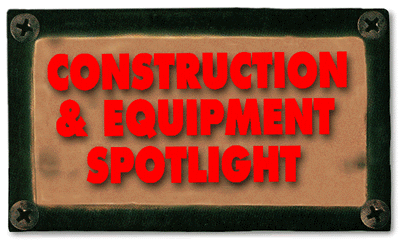|
| |
 April 24, 1997 |
|
| |
 April 24, 1997 |
High tech comes to heavy equipment industry
By SCOTT HIGHLAND Technology may seem incompatible with the muscle associated with heavy equipment, but technological tools are used in many aspects of the industry that supplies digging, paving and building tools. But technology drives several facets of the heavy equipment industry, including manufacturing, machinery operations, sales and service.
In a wonderful article in a recent issue of Forbes magazine written about Peter Drucker, the self-described "social ecologist," there is a warning to managers to use technology as a tool, not as a substitute for proper management. "Drucker has this warning for chief executives mesmerized by technology: All great change in business has come from outside the firm, not from inside." With that disclaimer, let me describe some of the technological tools currently being used in the heavy equipment industry which have resulted in improved efficiency, competitiveness and greater profitability for equipment manufacturers, distributors, and contractors.
ManufacturingManufacturers have geometrically reduced the time necessary to create new products or the next generation of an existing product using computerized design and manufacturing techniques. As an example, a software tool used for three-dimensional modeling is called Pro-E. The creative engineering of a component is done with this program as the first step. The same software is then used to drive the automated manufacturing process that yields the prototype part. John Deere has updated every product model in its industrial equipment line in the last 30 months -- more than 40 models in all. Ten years ago it would have taken 30 months for a single model.
Machinery operationsTechnology plays an important part in the design and production process, but it also plays an integral part in the operation of the machinery itself. Current production excavators employ sophisticated electronic controls that direct hydraulic functions and engine operation. Proper service requires specially built, indestructible laptop computers to effectively diagnose component failures in these machines.
Each of our service departments is equipped with this sophisticated laptop that plugs directly into an electronic monitor board near the operator's compartment. It reads service fault codes and directs service technicians to the likely problem. On the new John Deere H-series loaders and C-series dozers, the fault codes read out automatically on the machines' dashboards.
Sales and serviceElectronic mail and data transfer have become the predominant means of communication between distributors and their manufacturers. Everything from service bulletins and parts ordering to warranty claims and product specifications are transmitted via satellite and modem. Even within our dealership, electronic communication has become indispensable. Each of our nine locations in Washington and Alaska are joined using a "frame relay system" that transmits both voice and data communications. Managers are joined in a wide area network (WAN), allowing use of common data bases, e-mail and scheduling procedures. Product support and sales departments will soon be managing their customer data base and scheduling their calls using portable computers with a proprietary software package. This software will link them directly to dealership data bases, quote programs, owning and operating cost analysis, financing tools and specifications. They will be able to compare various purchase options for customers, quote prices, analyze financing options, prepare purchase or lease documents and transmit that data from the field. Not only will our staff save time, but customers will have better and more timely information with which to make decisions.
The Internet offers unlimited opportunities for manufacturer, distributor and customer communication. Customers can access information on a dealership's web site, such as used equipment inventories, parts and service promotions, and equipment model specifications. Web pages like this are only the beginning of the Internet/Intranet opportunities. I believe that in the very near future, customers will have access to dealership parts inventories and be able to place parts orders anytime night or day, for pickup or delivery within 24 hours. But as Drucker warned, technology should be used as a tool. It should not replace personal, one-on-one information gathering by managers and executives. And it should not make the customer invisible. Back to the Forbes article: Drucker goes against the grain of the current enthusiasm for computers in business. He thinks it's somewhat overdone. "I find more and more executives less and less well informed [about the outside world], if only because they believe that the data on the computer printouts are ipso facto information," Drucker said. "I tell all my clients that it is absolutely imperative that they spend a few weeks each year outside their own business and actively working in the marketplace. ... The best way is for the chief executive officer to take the place of a salesman twice a year for two weeks." The heavy equipment industry should take notice. Technology manufacturers are able to design and update products more quickly than ever before, but unless manufacturers are out in the field talking to the customers who are actually using their products on a daily basis, the changes are not necessarily going to be what customers need or want, and sales will ultimately suffer. Technology is a great tool but it must not replace basic business fundamentals such as talking with customers. It should be thought of as a component, not a replacement for solid business relationships. Scott Highland is president of Smith Tractor & Equipment Co., Inc., a heavy equipment dealership in Washington and Alaska.
 djc home | top | special issues index
Copyright © 1997 Seattle Daily Journal of Commerce. |